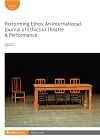- Home
- A-Z Publications
- Performing Ethos: International Journal of Ethics in Theatre & Performance
- Previous Issues
- Volume 4, Issue 1, 2013
Performing Ethos: International Journal of Ethics in Theatre & Performance - Volume 4, Issue 1, 2013
Volume 4, Issue 1, 2013
-
-
Laughter and Trauma: Making Sense of Colonial Violence
More LessAbstractAboriginal Australian performances, created from within their own traditional practices, have often dealt with aspects of European colonization and racism in a humorous manner. There are numerous accounts of these, including performances that were satirical and which treated traumatic acts of racialized violence in Australia in a comedic form. Indeed, Aboriginal audiences are documented as laughing uproariously at these performances. Examples include performances from Arnhem Land in the north, which centred on white men abducting women for sexual use; others from Stradbroke Island, off the coast of Queensland, include the ways in which the Europeans in the volunteer land army used their training and arms to kill Aboriginal people. This article examines the translation of traumatic events into comedic performances in the context of the major trauma of colonization, illustrating the particular manner by which humour offers ways of acting out and dealing with events that cause communal and individual traumas.
-
-
-
Traumas of Acting Physical and Psychological Violence: How Fact and Fiction Shape Bodies for Better or Worse
More LessAbstractViolation and injury (both physical and psychological) are aspects of life and therefore figure significantly; not only in much dramatic storytelling, but also in the life circumstances that doctors, nurses, emergency professionals and even the military encounter. However, in theatrical, cinematic or simulated performance of violence, little attention is paid to possible traumatization of participants and those who witness such dramatizations. Such performances are deemed merely fictions or simulations, and are therefore considered benign. However, experts in trauma have found that the body does not distinguish between cognitively understood fiction and perceived experience. Therefore, management of traumatization requires both cognitive awareness and embodied engagement with the possibilities of traumatization. What is needed is greater duty of care in preparing those participating in theatrical, cinematic and simulated performances of violence to become more resiliently vulnerable, so that they can support themselves and their peers in negotiating the inevitability of trauma.
-
-
-
Quietude, Restlessness and Uproar: Towards an Ethics of Speech and Silence in ‘In Eldersfield, Chapter One: Elegy for Paul Dirac’
More LessBy Simon BowesAbstractThe article is presented as a response to a recent work which I co-devised and in which I performed. It is intended to draw correlations between performance and ethical philosophy to explore speech and silence as potentially traumatic encounters with the Other. Elegy at once reveals and obscures the physicist Paul Dirac, a legendarily taciturn figure, in response to the following anecdote: sitting in the laboratory at St. John’s College, Cambridge, a colleague asked him: ‘Where are you going on your holidays?’ Twenty minutes later, he replied: ‘Why do you want to know?’ Staging this silence and stillness in real time, in the middle of an hour-long show, Elegy implicitly suggests Dirac’s quietude as a response to trauma. The article also reflects on Elegy to reconsider the virtues of patience and passivity in a performance culture increasingly defined by an immediacy of response and of proliferating new modes of agency.
-
-
-
Book Reviews
More LessAuthors: Alison Jeffers and Margherita SprioAbstractTrauma-Tragedy: Symptoms of contemporary performance, Patrick Duggan (2012) Manchester: Manchester University Press, 240 pp., ISBN 978 0 7190 8542 0, hbk, £60.00
Seeing Witness: Visuality and the ethics of testimony, Jane Blocker (2009) Minneapolis, MN: University of Minnesota Press, 153 pp., ISBN 978-0-8166-5476-5, pbk, $25.00
-
Most Read This Month


